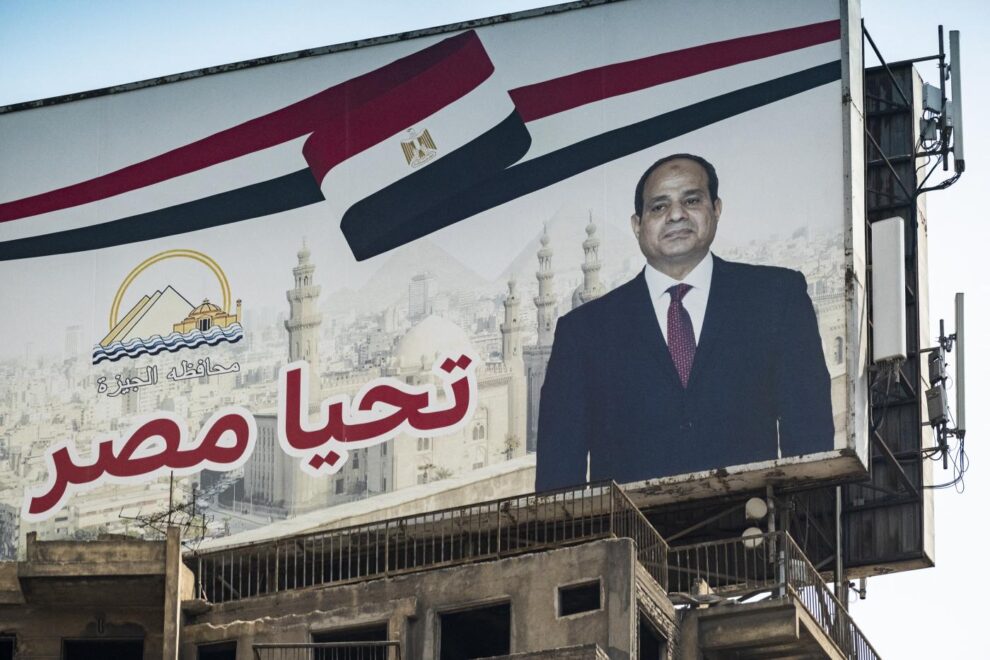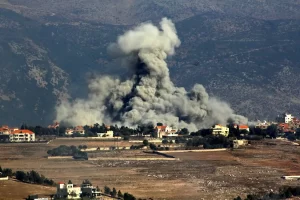Despite having presided over the mass killing of some 1,000 fellow citizens after seizing power in the summer of 2013; having subsequently executed hundreds and imprisoned tens of thousands of Egyptians for alleged political offences; having driven at least a third of the population into poverty; and having accumulated a national debt of $400bn – squandered on useless military acquisitions and vanity construction projects – Egyptian President Abdel Fattah el-Sisi has kept a firm grip on power.
Sisi is not unique among today’s increasing crop of ruthless dictators. The much-hyped “third wave” of democratisation that commenced in the mid-1970s, further propelled by the collapse of the Soviet Union some 15 years later, has receded, leaving in its wake authoritarian rulers of a much tougher bent than their predecessors.
Sisi’s “hard” compared to Mubarak’s “soft” authoritarianism is a case in point.
This raises the interrelated questions of why authoritarian regimes like Sisi’s have toughened up and what their likely futures are. Might they be compelled to liberalise into softer versions or even semi-democratic ones? Could their own history of seizing power by force of arms be repeated, but with them on the receiving end? And what are the prospects for revolution or systemic breakdown?
The assessment of Sisi’s prospects may be suggestive of those of his fellow dictators.
Abandoning ‘pacting’
Transitions from authoritarian to democratic orders following that in Portugal in 1974 typically resulted from the formation of pacts between soft-liners within regimes and moderate opponents, who coalesced against their respective hard-liners.
Authoritarian persistence has rendered the ‘pacting’ method of democratisation ever rarer
Regime soft-liners sought to either retain some power or at least escape retribution for their previous political sins, while moderate oppositionists were willing to accommodate those desires and forego revenge in order to secure a peaceful transition.
Authoritarian persistence has rendered this pacting method of democratisation ever rarer. The preconditions for pacting have become less prevalent, and authoritarians now have more repressive tools and greater support at their disposal.
Pact-based transitions were associated with mobilised, politically-conscious citizenries and with politicised militaries in which the officer corps were at least partially divided by contending political outlooks.
Transitions typically occurred in countries with some democratic traditions and in the wake of economic, foreign policy or military crises. It is noteworthy that in political science and “transitology” literature, the one form of military rule identified as least likely to undergo pacted transitions to democracy was that labelled “sultanistic”, referring to highly personalised rule by a leading military figure, of which Sisi serves as a veritable archetype.
Military ‘sultanism’
Egypt’s military sultanism is, for the Arab world, a unique blend of an institutionalised, politically unified military keenly aware of and dedicated to its central role in the country’s political economy.
It is presided over by a president who rewards and punishes officers based on intrusive intelligence about their behaviour and attitudes. His background in military intelligence – the principal function of which is to spy on the officer corps – prepared him uniquely well to play the sultanistic presidential role.
Former President Gamal Abdel Nasser was an infantry officer, as was Anwar Sadat, who served on active duty for less than five years. Mubarak rose within the politically irrelevant air force. Coup proofing by these presidents was thus less effective, as evidenced by nearly successful attempts against Nasser by his defence minister, Abdel Hakim Amer, and against Mubarak by Defence Minister Abd al Halim Abu Ghazala.
In both cases the presidents pre-empted the coup. Sadat continually purged his officer corps in the wake of the 1973 war, presumably assuming they were plotting against him. And indeed, the plot that took his life involved a conspiracy between Islamists and commissioned, if low-ranking officers.
In sum, the Egyptian military, due to its institutionalised, apolitical nature (other than believing in its own right to rule) and being carefully scrutinised by Sisi’s eagle eye, does not meet the criteria essential for a pacted transition. Nor is it adventurous, so is unlikely to precipitate a military disaster as it had in 1967 and as did the Greek and Argentinian militaries.
‘One hand’
The standard line of the Egyptian high command is that the military’s role is to defend Egypt’s borders, which strictly speaking is not true, as its small interventions in Libya and Sudan attest. But it clearly now seeks to avoid politically costly foreign entanglements of the sort in which it was bogged down in Yemen from 1962 until 1968, a lesson which likely accounts for Sisi’s refusal to order Egyptian units to join Mohammed bin Salman’s Saudi forces fighting fruitlessly there since 2015.
On the other side of the military/civilian divide, the latter is far from being united against the former, whereas pacted transitions typically require deep-seated anti-military sentiments. “The people and the military are one hand,” a memorable slogan from the 2011 mass demonstrations, accurately reflects the pervasive positive image of the military.
Unlike in Iran in 1978-79, where the Khomeinists were intent on splitting the Shah’s military by recruiting disaffected non-commissioned officers to their cause, Egyptian protesters sought to win support from the military as a whole to eject Mubarak from the presidency.
Secularists and Islamists competed with one another for the military’s blessing, with the latter winning that competition, if briefly. The military deemed Islamists to be more competent, hence both a more useful and more threatening force, requiring subtle handling during the year of Mohamed Morsi’s presidency.
Sisi’s persistent hard authoritarianism, like that of other contemporary dictators, is also due to new tools of totalitarian control. The old methods of surveillance, such as wire-tapping and doormen in the pay of the intelligence service, have given way to electronic monitoring of virtually all aspects of citizens’ lives.
The requirement that most dealings with government, ranging from paying utility bills to obtaining subsidised commodities, is electronic, complements the monitoring of and disinformation in social media, to say nothing of thoroughgoing eavesdropping of cell phones and the internet.
The chilling effect on public discourse has been profound, which is no doubt the intent of the government when it draws upon its ubiquitous means of surveillance to decide who to imprison or disappear.
Global context
Just as the Egyptian context is not conducive to a transition from authoritarianism, nor are the global or regional ones.
The wave of economic globalisation that helped propel democratisation slowed dramatically in 2007-2008 and has not subsequently recovered. The long-standing association of communist dictatorships with economic incompetence has passed into history, replaced by a global perception that if anything, authoritarians do better than democrats at guiding economic growth. China serves as the embodiment of that belief, which it uses its economic power to reinforce.
The promise to the IMF that Egypt would restrict spending on vanity projects rings hollow as new ones continue to be announced
The largely American-created global financial system, anchored in the US dollar, is now widely believed to serve the interests of wealthy western countries at the expense of all others. Parallels to the 1930s, during which democracies succumbed to economic depression while the Soviet Union and Germany began to prosper at least relatively, are striking.
Until overwhelmed by indebtedness and a foreign exchange crisis, the Egyptian economy was presented by Sisi as living proof that far from being incompatible with economic growth, an authoritarian government fostered it. He has yet to renounce that claim even as he pretends to be liberalising the economy to obtain further loans from the International Monetary Fund (IMF) and others.
The promise to the IMF that Egypt would restrict spending on capital-intensive, glorification projects rings hollow as new ones continue to be announced.
Regional context
The political economies of the Middle East and North Africa (Mena) have been trifurcated. At the top are the high performers which include the GCC states and Israel. Their economies and political ambitions are increasingly globalised, which is coupled with a downgrading of their regional interests.
Just like Washington and the European capitals, these Mena states increasingly view heavy economic and political investments in the region as paying insufficient dividends, at least as compared to other possible uses of their capital and diplomacy.
The consequences of this re-orientation are felt in other countries in the region.
Lebanon was the first to experience GCC and especially Saudi Arabia’s disinterest, as manifested by it abandoning Saad Hariri and interdicting the flow of capital to Beirut. Egypt is now being subjected to similar, albeit less draconian treatment. Saudi media is increasingly critical of Sisi and, as with the UAE, Kuwait and Qatar, is refusing to deposit further funds in Egypt’s central bank, demanding instead that capital provided be compensated for by shares in state-owned enterprises.
Haggling over the terms of those sales has delayed the transactions for months. The message is clear: Sisi and Egypt are now secondary concerns to GCC rulers.
The same is true for Israel. No longer posing a military threat, Egypt’s residual value to Jerusalem was as a mediator with the Palestinians and to a lesser extent, with some other Arab countries. Cairo’s leverage with both has eroded, so Israel can now safely bypass it and conduct direct dealings or draw upon its relationships with GCC countries to pressure the Palestinians.
At the other end of the trifurcated Mena region are the failed states of Libya, Sudan, Syria, Yemen, and to some extent Iraq and Lebanon. The top-tier Mena states’ primary interests towards these countries are to ensure that no hostile party gains the upper hand within them. But they are not ready to invest the financial and political capital necessary to rebuild them.
The Arab states in the middle are the “survivors”, including Morocco, Algeria, Tunisia and Egypt, all of which are in North Africa. Politically they have followed similar trajectories from soft authoritarianism, to popular uprisings and much harder authoritarian rule.
None appears to have bright economic or political prospects and none is any longer attracting much attention from the Gulf. Their key asset increasingly is that they are not failed states, so still capable of controlling the flow of migration and deterring terrorism.
It is these concerns that stimulate European interest in the form of economic and political support, no matter that they are all anti-democratic.
Egypt and Sisi are thus paradoxically becoming wards of the West and especially Europe. While Sisi may buy arms and a nuclear reactor from Moscow, and pursue Chinese investment in the Suez Canal Zone, his lifeline increasingly is western capital in the form of grants and loans.
The relationship is essentially one of blackmail, with western countries paying up to prevent the blackmailer from being displaced by chaos or refusing to cooperate to control migration and terrorism. This is not a healthy relationship, nor one likely to propel Egypt away from Sisi’s authoritarian rule.
Implications for Egypt’s future
Egypt’s political and economic outlooks are bleak. Absent the preconditions for a pacted transition away from authoritarian military rule, the prospects for democratisation or even for a softening of Sisi’s hard authoritarianism are not bright. But nor are the prospects good for his rule either.
Cairo faces an economic crisis that it is not capable of resolving, due to its own deficiencies and diminishing external support. Immiseration coupled with widespread corruption will continue to erode popular support. While the regime is unlikely to confront opposition that is strong and unified, whether of a peaceful or violent nature, it will face anomic disorder and unrest.
Sisi’s coup-proofing is systematic and effective, so unless the disorder and unrest reach levels that threaten military rule, he presumably will not be replaced by his fellow officers.
This scenario resembles that of contemporary Lebanon, where an incumbent ruling elite, in this case dependent on the key intelligence service and Hezbollah’s militia, is grimly hanging on to power despite a profoundly disaffected, but disempowered population. Just as the world has not rushed to address the plight of the Lebanese, so is it unlikely it will do so to save the Egyptians from their own misgovernance and deteriorating economic circumstances.
Rather, Egypt will become a sort of proxy war battleground, for the most part non-violent, as in Lebanon, where competing external powers will pursue their own interests to ensure that opponents do not gain the upper hand.
But no external power or combination of them will invest sufficient political or economic resources to right the ship of state or bail out the economy. Who will bail out will be individual Egyptians who, like the Lebanese, will seek to migrate to more hospitable lands.
Source : Middle East Eye






































